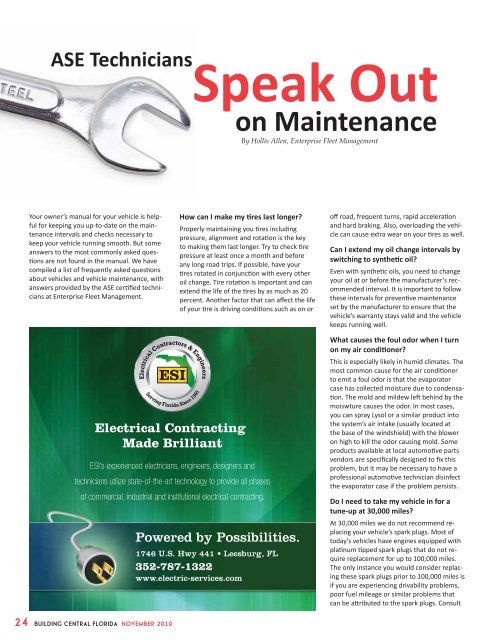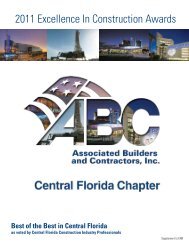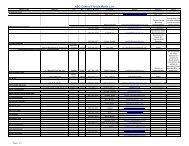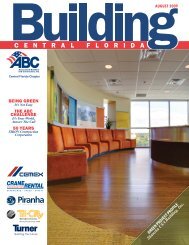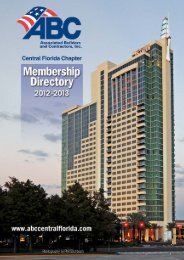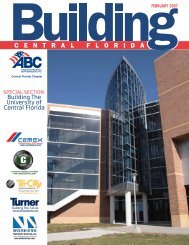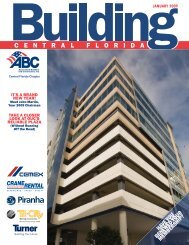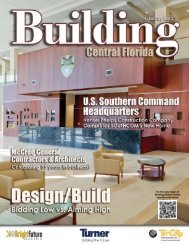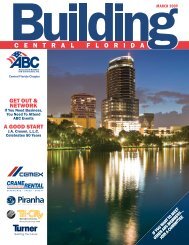November 2010 - Central Florida Chapter Associated Builders and ...
November 2010 - Central Florida Chapter Associated Builders and ...
November 2010 - Central Florida Chapter Associated Builders and ...
Create successful ePaper yourself
Turn your PDF publications into a flip-book with our unique Google optimized e-Paper software.
ASE Technicians<br />
Your owner’s manual for your vehicle is helpful<br />
for keeping you up-to-date on the maintenance<br />
intervals <strong>and</strong> checks necessary to<br />
keep your vehicle running smooth. But some<br />
answers to the most commonly asked questions<br />
are not found in the manual. We have<br />
compiled a list of frequently asked questions<br />
about vehicles <strong>and</strong> vehicle maintenance, with<br />
answers provided by the ASE certified technicians<br />
at Enterprise Fleet Management.<br />
24 BUILDING CENTRAL FLORIDA NOVEMBER <strong>2010</strong><br />
Speak Out<br />
on Maintenance<br />
By Hollis Allen, Enterprise Fleet Management<br />
How can I make my tires last longer?<br />
Properly maintaining you tires including<br />
pressure, alignment <strong>and</strong> rotation is the key<br />
to making them last longer. Try to check tire<br />
pressure at least once a month <strong>and</strong> before<br />
any long road trips. If possible, have your<br />
tires rotated in conjunction with every other<br />
oil change. Tire rotation is important <strong>and</strong> can<br />
extend the life of the tires by as much as 20<br />
percent. Another factor that can affect the life<br />
of your tire is driving conditions such as on or<br />
off road, frequent turns, rapid acceleration<br />
<strong>and</strong> hard braking. Also, overloading the vehicle<br />
can cause extra wear on your tires as well.<br />
Can I extend my oil change intervals by<br />
switching to synthetic oil?<br />
Even with synthetic oils, you need to change<br />
your oil at or before the manufacturer’s recommended<br />
interval. It is important to follow<br />
these intervals for preventive maintenance<br />
set by the manufacturer to ensure that the<br />
vehicle’s warranty stays valid <strong>and</strong> the vehicle<br />
keeps running well.<br />
What causes the foul odor when I turn<br />
on my air conditioner?<br />
This is especially likely in humid climates. The<br />
most common cause for the air conditioner<br />
to emit a foul odor is that the evaporator<br />
case has collected moisture due to condensation.<br />
The mold <strong>and</strong> mildew left behind by the<br />
moiswture causes the odor. In most cases,<br />
you can spray Lysol or a similar product into<br />
the system’s air intake (usually located at<br />
the base of the windshield) with the blower<br />
on high to kill the odor causing mold. Some<br />
products available at local automotive parts<br />
vendors are specifically designed to fix this<br />
problem, but it may be necessary to have a<br />
professional automotive technician disinfect<br />
the evaporator case if the problem persists.<br />
Do I need to take my vehicle in for a<br />
tune-up at 30,000 miles?<br />
At 30,000 miles we do not recommend replacing<br />
your vehicle’s spark plugs. Most of<br />
today’s vehicles have engines equipped with<br />
platinum tipped spark plugs that do not require<br />
replacement for up to 100,000 miles.<br />
The only instance you would consider replacing<br />
these spark plugs prior to 100,000 miles is<br />
if you are experiencing drivability problems,<br />
poor fuel mileage or similar problems that<br />
can be attributed to the spark plugs. Consult


